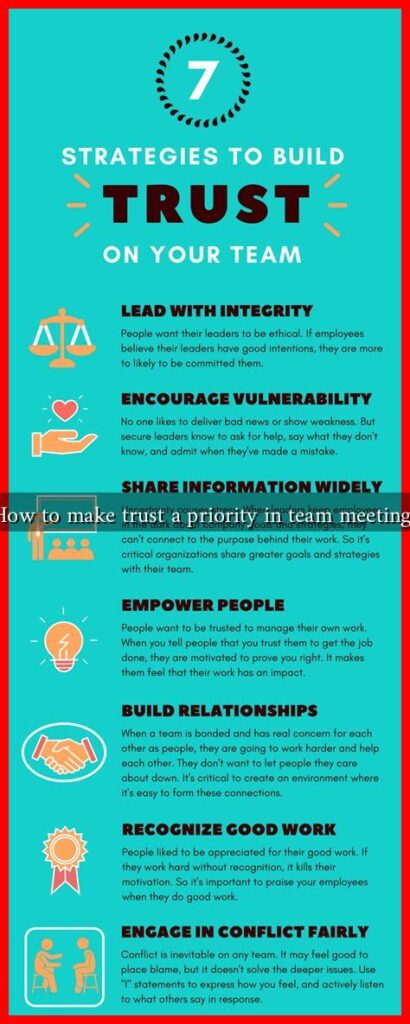-
Table of Contents
- How to Make Trust a Priority in Team Meetings
- The Importance of Trust in Team Meetings
- Strategies to Build Trust in Team Meetings
- 1. Establish Clear Meeting Objectives
- 2. Encourage Open Communication
- 3. Foster Psychological Safety
- 4. Build Relationships Outside of Meetings
- 5. Follow Through on Commitments
- Case Study: Google’s Project Aristotle
- Conclusion
How to Make Trust a Priority in Team Meetings
In today’s fast-paced work environment, effective teamwork is essential for success. One of the most critical components of successful teamwork is trust. When team members trust one another, they communicate openly, collaborate effectively, and innovate freely. However, building and maintaining trust can be challenging, especially in team meetings where diverse personalities and opinions converge. This article explores strategies to prioritize trust in team meetings, fostering a culture of collaboration and respect.
The Importance of Trust in Team Meetings
Trust is the foundation of any successful team. According to a study by the American Psychological Association, teams with high levels of trust are more productive, innovative, and engaged. When team members feel safe to express their thoughts and ideas, they are more likely to contribute meaningfully. Here are some key benefits of prioritizing trust in team meetings:
- Enhanced Communication: Trust encourages open dialogue, allowing team members to share their thoughts without fear of judgment.
- Increased Collaboration: When trust is present, team members are more willing to collaborate and support one another.
- Improved Problem-Solving: Trust fosters a safe environment for brainstorming and creative thinking, leading to better solutions.
- Higher Engagement: Teams that prioritize trust tend to have higher morale and job satisfaction, resulting in lower turnover rates.
Strategies to Build Trust in Team Meetings
Building trust in team meetings requires intentional effort and consistent practices. Here are several strategies that can help:
1. Establish Clear Meeting Objectives
Before each meeting, clearly outline the objectives and agenda. This transparency helps team members understand the purpose of the meeting and what is expected of them. When everyone is on the same page, it reduces anxiety and fosters trust.
2. Encourage Open Communication
Creating an environment where team members feel comfortable sharing their thoughts is crucial. Encourage participation by:
- Asking open-ended questions.
- Implementing a “no interruption” policy during discussions.
- Using tools like anonymous surveys or suggestion boxes to gather input from quieter team members.
3. Foster Psychological Safety
Psychological safety is the belief that one will not be penalized or humiliated for speaking up. To foster this environment:
- Model vulnerability by sharing your own challenges and mistakes.
- Recognize and celebrate contributions from all team members.
- Address conflicts constructively and encourage resolution rather than avoidance.
4. Build Relationships Outside of Meetings
Trust is often built through personal connections. Encourage team members to engage in team-building activities outside of formal meetings. This could include:
- Casual coffee breaks or lunches.
- Team outings or volunteer opportunities.
- Virtual team-building games for remote teams.
5. Follow Through on Commitments
Trust is built on reliability. Ensure that commitments made during meetings are followed through. This demonstrates accountability and reinforces the idea that team members can depend on one another.
Case Study: Google’s Project Aristotle
Google conducted a study known as Project Aristotle to understand what makes teams successful. The research revealed that psychological safety was the most important factor in high-performing teams. Teams that prioritized trust and open communication outperformed others, leading to better outcomes and higher employee satisfaction. This case study underscores the importance of trust in fostering effective teamwork.
Conclusion
In conclusion, making trust a priority in team meetings is essential for fostering a collaborative and productive work environment. By establishing clear objectives, encouraging open communication, fostering psychological safety, building relationships, and following through on commitments, teams can create a culture of trust that enhances performance and engagement. As demonstrated by Google’s Project Aristotle, prioritizing trust not only benefits individual team members but also contributes to the overall success of the organization. By implementing these strategies, teams can unlock their full potential and achieve remarkable results.
For further reading on building trust in teams, consider exploring resources from the American Psychological Association.

